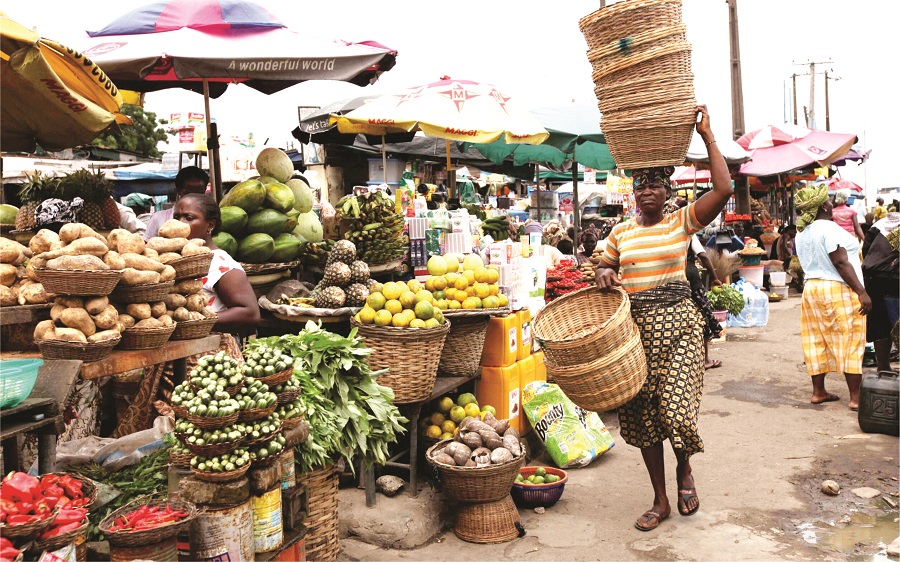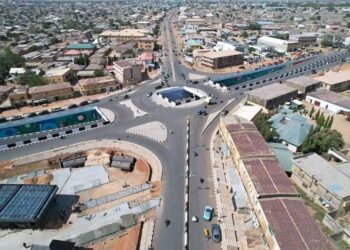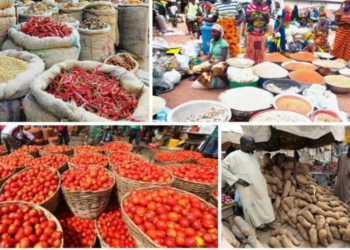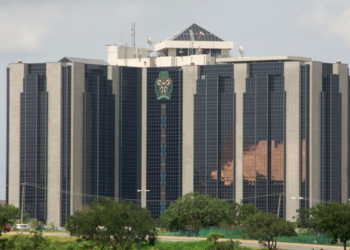“Drop? How?” was the reaction from Ruth after she read on Friday that Nigeria’s inflation rate had dropped to 16.63% in September 2021. She expressed dissatisfaction with the released numbers by the National Bureau of Statistics. “I wonder which markets they visited to come up with these statistics,” she complained.
To an average Nigerian, it would appear as though the numbers are not a true reflection of the market reality as food prices and the cost of services are surging across the country. Only recently, Nairametrics reported that the price of a big bag of beans skyrocketed to N100,000, representing over 140.96% year-on-year increase in price.
That is just one out of many other items that recorded significant increases in recent times. Some of which include electricity, fuel, education, barbing, transport, food items amongst others. Nigerians are really feeling the brunt of a recurrent and uncontrolled increase in the prices of items. Little wonder, Ruth suspected that the 16.63% inflation rate is unreflective of the market reality.
A bit of an explainer
It is imperative to explain the nitty-gritty of these numbers and the true implication of a 16.63% inflation rate for the month of September. First, let’s consider the methodology used by the National Bureau of Statistics (NBS). The statistical body employs the services of 10,534 informants across each state of the federation, who provide the prices of 740 goods and services on a monthly basis.
According to the statistical agency, they compare the price of each commodity to the base year’s price to obtain a relative price. For context, the Consumer Price Index (CPI) is the ratio of the cost of the market basket in the current year with that of the base year and multiplied by 100, this generates an index.
Now let’s take it a bit home, inflation rate is measured as the percentage increase in the Consumer Price Index, which already measures the purchasing power of a country’s unit of currency. In other words, when inflation rate increases, the purchasing power of an average Nigerian erodes, that is, loses power. You could also see it as, “your money will never be worth as much as it did yesterday.”
Now that we have explained that, let’s delve into the numbers. The recent inflation report released by the NBS shows that the country’s composite Consumer Price Index rose by 16.63% year-on-year to 396 index points in September 2021 from 339.5 points recorded in the corresponding period of 2020. Meanwhile, in the previous month, the CPI rose by 17.01% year-on-year to 391.5 index points.
While it seems like the rate had dropped, it is the rate of increase that has dropped not the Consumer Price Index, which means that the purchasing power of Nigerians continues to grow weaker. Interestingly, inflation is also desirable in an economy, because when people expect the price of items to go up, they spend now and hence spur growth in the economy. However, a double-digit inflation rate is a huge burden to bear.
On the other hand, when there is an expectation for the general price of goods and services to drop, the natural action of people will be to keep their money while they wait for the prices to fall. This would mean, monies are kept idle, hence stalling economic growth.
Back to the numbers, the rate recorded in the review month indicates that the rate at which the prices of things rose in the month of September compared to its corresponding period of last year is lower than the rate of increase recorded in August 2021 in comparison to its reference period. For more clarity, let’s consider the month-on-month movement in the CPI.
The Consumer Price Index rose by 1.15% month-on-month in September from 391.5 points in August to 396 points in the review month. This answers the question of whether the general prices of goods and services increased on not. To answer the question, “they did.”
However, you could wonder that 1.15% is not a true reflection of the month-on-month increase, well in this case, it is huge. Do not forget that the Consumer Price Index in the first place is an index obtained by a ratio of two numbers, which means if it surpasses 100 index points by as little as 1, a significant increase has occurred.
Remember also that the index captures both volatile and non-volatile items, which means that as much as the aggregate price increased, some food items will reduce in price due to seasonality effects, as well as the function of demand and supply.
How we performed compared to other African countries
A comparative analysis with other African countries paints a rather grim picture of the state of inflation in Nigeria. With over 206 million people and the largest economy on the continent, Nigeria’s inflation rate has averaged 17.42% between January and September 2021, dropping for the sixth consecutive month in September.
Meanwhile, a comparative study with other notable African countries shows the level of inflationary pressure being suffered by the Nigerian populace. In the month of September 2021, Ghana’s inflation rate rose to 10.6% from 9.7% recorded in the previous month, this represents a variance of over 6% points to Nigeria’s 16.63%.
In the same vein, South Africa’s inflation rate climbed for the first time in three months to 4.9% in August 2021. This is over 11% points lower than the inflation rate recorded in Nigeria. Similarly, Egypt’s inflation rate rose to 6.6% in September, representing over 10% deviation from Nigeria’s figure.
These comparisons show how bad a 16% inflation rate can be when compared to other countries.
Why the continuous increase
The Consumer Price Index considers two components, which are the food index and the core index, (all items less farm produce). According to the NBS the highest increases in the price of core items were recorded in cooking gas, household textile, garments, motor car, game of chance, major household appliances whether electric or not.
Others include passenger transport by air, hospital services, other services in respect to personal transport equipment, wine, clothing materials, other articles of clothing and clothing accessories, non-durable household goods.
The increase in the price of these items could not be too far from the downturn in the FX market. Notably, at the official Investors and Exporters window, the exchange rate against the US dollar has depreciated by 2.88% year-to-date, closing at a record low of N422.07/$1 on Friday. On the other hand, according to information obtained by Nairametrics from BDC operators, the exchange rate is still trading at N572/$1.
Most of the items listed above are imported and in essence, depend on movement in the exchange rate. This means that as the exchange rate depreciates the cost of importing these items will continue to rise, consequently contributing to inflationary pressure.
On the other hand, the growth in the food index was largely driven by increases in the prices of oils and fats, bread and cereals, food product, fish, coffee, tea and cocoa, potatoes, yam and other tuber and milk, cheese and egg. While, the increase in food items could be attributed to structural problems ranging from insecurity in the north, cost of transportation and seasonality effect, it continues to be cause for worry as the food inflation is currently at 19.57%
Nigeria’s food inflation tilted towards the upside since 2019, when the land borders were shut by the federal government, as a means to curb dumping and discourage importation of some food items. However, despite the reopening of these borders, the prices are yet to normalize and instead are surging.
Bottomline
It is understandable that Nigerians out of the sheer frustration of having to spend more and more on a daily basis would think that a decline in the inflation rate is not a true reflection of the market, especially since incomes are not necessarily increasing. However, it is worth noting that a 16.63% inflation rate is terrible enough, as it is only moderating from the upsurge recorded in the previous year, during the pandemic.

















